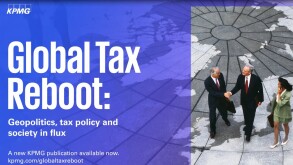As the global project to modernise international tax rules nears the finish line, over 130 countries have agreed on a final set of proposals for preventing base erosion and profit shifting (BEPS), and tax leaders of international companies have a clearer view of the emerging framework. Now, as the world’s focus shifts to domestic implementation, many tax leaders will likely have their hands full managing the potential impacts.
This article will highlight some of the biggest issues tax leaders are facing globally, along with practical steps to address these concerns.
Detailed rules, tight timelines
In July 2021, the 130+ countries comprising the Inclusive Framework on BEPS endorsed the main elements of the package. This was followed by release of a detailed agreement in October 2021 and model rules for a global minimum tax in December 2021. These releases provided more details on how the rules will operate, and how and when they will be implemented.
In particular, the releases flesh out the two pillars of the BEPS 2.0 global action plan:
Pillar 1 rules would change how profits and taxing rights are allocated, using a formulary approach to recognise a portion of profits in market jurisdictions;
Pillar 2 would discourage profit-shifting to low-tax locations by international groups through a form of global minimum tax levied at the rate of 15%.
Country-by-country reactions
Now that the global framework is mostly set, interest is growing about how individual countries will react. Signing on to BEPS 2.0 means some jurisdictions may have to, for example, change their existing tax incentives for attracting foreign investment or replace them with grants or subsidies. This could greatly affect tax and financing strategies going forward. Tax leaders need to keep up with the changing tax landscapes in each jurisdiction their group operates in so they can understand both the local context and the bigger picture.
Consistent rules
Tax leaders are closely watching how the Inclusive Framework members intend to see that new rules are applied consistently across jurisdictions, especially where the global minimum tax is concerned. The timing of implementation is critical for tax leaders to understand how and when they will need to update their organisation’s systems to produce the data needed to comply with the final rules.
Differences in legislative processes are expected to make it challenging to monitor progress and track when laws come into effect from one jurisdiction to another.
Consistent disclosures
Transparency reporting continues to proliferate with BEPS 2.0, with some organisations required to comply with different frameworks. These include the Global Reporting Initiative’s global tax reporting standard (GRI 207), the OECD’s country-by-country reporting rules and the European Union’s public country-by-country reporting rules. Tax leaders face considerable challenges understanding the various rules and reconciling their organisation’s disclosures under these frameworks.
Communicating with stakeholders
Tax leaders say that their organisation’s senior business leaders are taking a direct interest in the Inclusive Framework’s discussions, and they are looking for answers about how BEPS 2.0 will affect their business. Tax leaders should be able to understand and explain how their tax profile may change under various scenarios (discussed further below) so they can help optimise the organisation’s tax position in the changing environment.
In particular, some boards and management committees believe that the new rules only target digital operations and delivery methods. However, tax leaders should help them understand that the much broader implications for most large international groups. For example, the rules could drive up cash tax costs and reduce earnings per share, and their interaction with withholding and other taxes could affect administrative processes for invoicing, cash flows and reporting.
Complying with the rules will likely require more human and technological resources. Tax function budgets are expected to increase accordingly, and everyone in the organisation who touches the compliance process should be aware of new data collection and reporting requirements. Existing information systems may need to be upgraded to cope with the high volumes of data, including non-financial information, that must be gathered and analysed.
Cooperation with finance teams
Close cooperation with finance teams will likely be particularly critical. The latest announcements from the Inclusive Framework contain extensive discussion about the computation of the tax base for the global minimum tax, including the use of deferred tax accounting to reconcile tax and financial accounts. Tax and finance teams should work together closely to satisfy these requirements and help ensure consistency among tax and accounting data.
Employing dedicated project management
Identifying and managing all of the potential impacts of BEPS will likely require collaboration between multiple disciplines across the organisation, including finance, transfer pricing and customs. Given the scale and complexity of the coming changes, some organisations are appointing dedicated project managers to effectively marshal all the specialised skills and knowledge that are needed.
Updating scenario modelling
The reforms are complex and could intersect with existing domestic rules. It is important for international companies to use appropriate assessment tools to model impacts, evaluate interdependencies and prevent double taxation or other inadvertent outcomes.
While aspects of the rules are still being fine-tuned, such as the safe harbour exception, enough is known to identify which entities are likely to meet the exemption based on their effective tax rate and which ones may not. This can also involve assessing whether a structure may include excluded entities and how certain tax concessions might operate.
Previous modelling done should be redone in view of the final rules, especially as Pillar Two differs significantly from the initial October 2020 proposals. Tax leaders are advised to revisit the assumptions and limitations used in any prior modelling and run new calculations when needed.
Once this evaluation is complete, a more detailed assessment is advisable to determine potential additional liabilities under the global minimum tax and whether the company might benefit from making any potentially available elections.
Are you ready? Take stock with a post year-end review
The year-end processes currently underway for many international companies offer a great chance to gauge the organisation’s readiness to comply with the new data and reporting requirements that the new rules will impose for 2023 onwards. During the current-year process, you can identify which of these data you already collect, which of this data needs to be adjusted before it can be used (e.g. deferred tax expenses recorded at rates exceeding 15%), and what other information might be needed for compliance or to support exclusions (e.g. tangible assets, payroll).
In short, these reforms are expected to have wide-ranging effects on many international businesses, and the timeline for implementation is ambitious. Tax leaders may need to move quickly to assess the potential impacts, advise senior executives and other stakeholders on the coming changes, and determine what needs to be done to comply with the new rules and manage their implications.

































